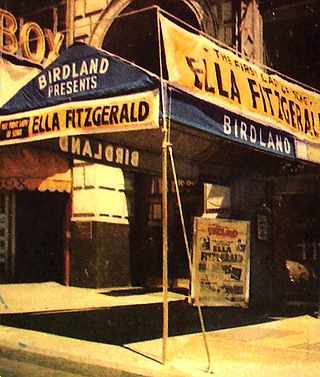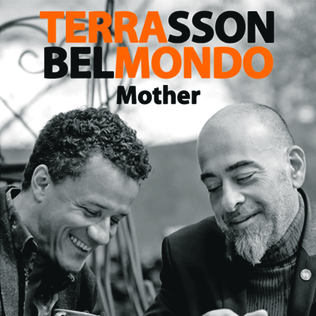Related Research Articles

Anita Belle Colton, known professionally as Anita O'Day, was an American jazz singer and self proclaimed “song stylist” widely admired for her sense of rhythm and dynamics, and her early big band appearances that shattered the traditional image of the "girl singer". Refusing to pander to any female stereotype, O'Day presented herself as a "hip" jazz musician, wearing a band jacket and skirt as opposed to an evening gown. She changed her surname from Colton to O'Day, pig Latin for "dough", slang for money.

Boniface Ferdinand Leonard "Buddy" DeFranco was an Italian-American jazz clarinetist. In addition to his work as a bandleader, DeFranco led the Glenn Miller Orchestra for almost a decade in the 1960s and 1970s.
"Time After Time" is a romantic jazz standard with lyrics written by Sammy Cahn and music by Jule Styne in 1946.
"Come Rain or Come Shine" is a popular music song, with music by Harold Arlen and lyrics by Johnny Mercer. It was written for the Broadway musical St. Louis Woman, which opened on March 30, 1946, and closed after 113 performances.
"I'll Remember April" is a popular song and jazz standard with music written in 1941 by Gene de Paul, and lyrics by Patricia Johnston and Don Raye. It made its debut in the 1942 Abbott and Costello comedy Ride 'Em Cowboy, being sung by Dick Foran. The lyric uses the seasons of the year metaphorically to illustrate the growth and death of a romance. The lyric also uses the ideas of the hours in a day and the flames of a fire to illustrate a relationship growing stronger and subsequently losing strength. Another interpretation is the use of spring to express the loves that were had in youth and remember them when the autumn of life arrives with affection and nostalgia, smiling: "I'll remember April and I smile". The song has been described as one which makes use of nostalgia.

Birdland is a jazz club started in New York City on December 15, 1949. The original Birdland, which was located at 1678 Broadway, just north of West 52nd Street in Manhattan, was closed in 1965 due to increased rents, but it re-opened for one night in 1979. A revival began in 1986 with the opening of the second nightclub by the same name that is now located in Manhattan's Theater District, not far from the original nightclub's location. The current location is in the same building as the previous headquarters of The New York Observer.
"Yesterdays" is a 1933 song about nostalgia composed by Jerome Kern with lyrics by Otto Harbach. They wrote the song for Roberta, a musical based on the novel Gowns by Roberta by Alice Duer Miller. "Yesterdays" was overshadowed by the musical's more popular song, "Smoke Gets in Your Eyes", which was a number one hit for the Paul Whiteman orchestra.
"Spring is Here" is a 1938 popular song composed by Richard Rodgers, with lyrics by Lorenz Hart for the musical I Married an Angel (1938), where it was introduced by Dennis King and Vivienne Segal.
"It Never Entered My Mind" is a show tune from the 1940 Rodgers and Hart musical Higher and Higher, where it was introduced by Shirley Ross.
"You'd Be So Nice to Come Home To" is a popular song written by Cole Porter for the 1943 film Something to Shout About, where it was introduced by Janet Blair and Don Ameche. The song was nominated for the Academy Award for Best Original Song in 1943 but lost to "You'll Never Know".
"Mean to Me" is a popular song with music by Fred E. Ahlert and lyrics by Roy Turk, published in 1929. Hit versions that year were by Ruth Etting and by Helen Morgan. Ben Bernie and the Hotel Roosevelt Orchestra also recorded what might be the first male version in February 1929 with vocals by Scrappy Albert.

Irene Higginbotham was an American songwriter and concert pianist. She is best known for co-writing the Billie Holiday song "Good Morning Heartache" (1946).
"Don't Explain" is a song written by jazz singer Billie Holiday and Arthur Herzog Jr. It was Billie Holiday’s final song.
"Stella by Starlight" is a popular song by Victor Young that was drawn from thematic material composed for the main title and soundtrack of the 1944 Paramount Pictures film The Uninvited. Appearing in the film's underscore as well as in source music as an instrumental theme song without lyrics, it was turned over to Ned Washington, who wrote the lyrics for it in 1946. The title had to be incorporated into the lyrics, which resulted in its unusual placement: the phrase appears about three-quarters of the way through the song, rather than at the beginning or the end.
"Beautiful Love" is a popular song composed by Wayne King, Victor Young and Egbert Van Alstyne with lyrics by Haven Gillespie. It was introduced by the Wayne King Orchestra in 1931. The song has been called the "second favourite number" of King, after the Orchestra's theme song "The Waltz You Saved for Me".
"Everything Happens to Me" (1940) is a pop standard written by Tom Adair (lyrics) and Matt Dennis (music). It was first recorded by the Tommy Dorsey Orchestra featuring Frank Sinatra. Unusually, the song focused on Sinatra's vocal, with no trombone solo by Dorsey. Years later, Sinatra rerecorded the song with the Hollywood String Quartet; this version was featured on his 1957 album Close to You.
Columbia Jazz Masterpieces was a series of Jazz CD, LP and cassette reissues from Columbia Records which began in 1986. Written inside the blue box used on all the album covers "Digitally Remastered Directly from the Original Analog Tapes." In Europe, the series was known as CBS Jazz Masterpieces, with the reissues being released by CBS Records, until 1991, when the Columbia Jazz Masterpieces title was used on all subsequent releases and represses.
"I Can't Believe That You're in Love with Me" is a 1926 popular song and jazz standard composed by Jimmy McHugh, with lyrics by Clarence Gaskill.

Gouache is a 2012 studio album by jazz pianist and composer Jacky Terrasson. The vocalist Cécile McLorin Salvant appears on two tracks. The album was released in Europe by Universal and in the U.S. by Sunnyside the following year.

Mother is a collaborative studio album of jazz pianist Jacky Terrasson and jazz trumpeter Stéphane Belmondo. The album was recorded in Pompignan, France and released on September 2, 2016, by Impulse! Records. This is Terrasson's second release for Impulse! The album contains 14 tracks, a mix of jazz standards and the originals written by bandmembers. The title track of the album, the melancholic ballad "Mother", has already appeared on Terrasson's album Gouache released in 2012. Originally, the album was supposed to be called Twin Spirit, but the duo chose to name it Mother due to the memory of Terrasson's suddenly deceased mother.
References
- 1 2 3 4 5 6 7 8 9 10 11 12 13 14 15 16 17 18 19 20 21 22 23 24 Gioia, Ted (2012). The Jazz Standards: A Guide to the Repertoire. New York City: Oxford University Press. pp. 466–468. ISBN 978-0-19-993739-4.
- 1 2 Wilson, Jeremy. "'You Don't Know What Love Is' (1941)", JazzStandards.com, accessed October 15, 2017
- ↑ https://www.discogs.com/release/2276793-Anita-ODay-An-Evening-With-Anita-ODay
- ↑ "Charlie Rouse - Yeah! (Vinyl, LP, Mono) Discogs". Discogs . 1961. Retrieved January 27, 2019.
- ↑ "The Nina Simone Database" . Retrieved December 21, 2018.
- ↑ "Mother - Jacky Terrasson, Stephane Belmondo | Songs, Reviews, Credits | AllMusic". AllMusic . Retrieved 27 September 2020.